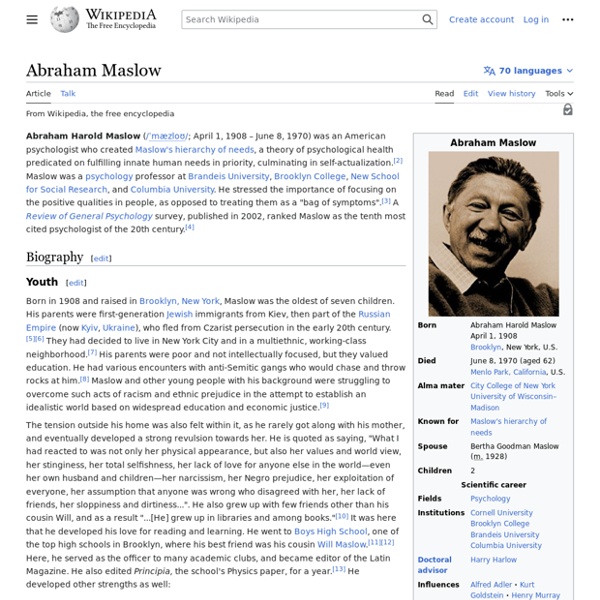Murray's system of needs
Part of Henry Murray's theory of personality In 1938, Henry Murray developed a system of needs as part of his theory of personality, which he named personology. He argued that everyone had a set of universal basic needs, with individual differences on these needs leading to the uniqueness of personality through varying dispositional tendencies for each need; in other words, specific needs are more important to some than to others. In his theory, Murray argues that needs and presses (another component of the theory) acted together to create an internal state of disequilibrium; the individual is then driven to engage in some sort of behavior to reduce the tension. Murray believed that the study of personality should look at the entire person over the course of their lifespan – that people needed to be analysed in terms of complex interactions and whole systems rather than individual parts – and an individual's behaviors, needs and their levels, etc. are all part of that understanding.
Affection
Un baiser peut exprimer l'affection. L'affection (du latin affectio signifiant ici « affection » ou « bienveillance ») est un sentiment du type amour au sens très large : un sentiment positif donc qui comme les autres formes d'amour nous fait souhaiter le bien-être ou le bonheur d'autrui de manière réciproque, voire nous pousse à y participer de notre mieux. On peut comparer l'affection à l'amitié ou la tendresse, et son expression à la bienveillance ou tout simplement à la bonté. Une personne manifestant de l'affection est dite affectueuse. L'affection a suscité un nombre d'études en philosophie et psychologie concernant le sentiment lui-même (populairement l'amour, la dévotion, etc.) ainsi que l'influence de cet état d'âme[1]. Psychologie[modifier | modifier le code] Dans la psychologie, les termes affect et affection sont de grande importance. Le psychologue américain Henry Murray (1893–1988) a développé une théorie de personnalité organisée en termes de motivations et de besoins.
Motivation
La motivation est, au sein d'un organisme vivant, la composante ou le processus en jeu pour l'engagement dans une activité précise. Elle en détermine le déclenchement, la direction, l'intensité et en assure la prolongation jusqu'à l'aboutissement ou l'interruption. Cette notion se distingue du dynamisme, de l'énergie ou du fait d'être actif. La motivation prend de nos jours une place de premier plan dans les organisations. Se manifestant habituellement par le déploiement d'une énergie (sous divers aspects tels que l'enthousiasme, l'assiduité, la persévérance), la motivation est parfois trivialement assimilée à une « réserve d'énergie ». Mais plus qu'une forme « d'énergie potentielle », la motivation est une instance d'intégration et de régulation d'une multitude de paramètres relatifs aux opportunités d'un environnement et aux sollicitations d'une situation. « Rien n'est plus insondable que le système de motivations derrière nos actions[1]. » Kant propose deux origines de la motivation.
Peak experience
Origins[edit] Many of the nuances that the term now connotes were expounded by psychologist Abraham Maslow, in his 1964 work Religions, Values, and Peak Experiences.[1] To some extent the term represents Maslow's attempt to "naturalize" those experiences which have generally been identified as religious experiences and whose origin has, by implication, been thought of as supernatural. Maslow (1970) believed that the origin, core and essence of every known "high religion" was "the private, lonely, personal illumination, revelation, or ecstasy of some acutely sensitive prophet or seer" (p. 19). The nature of peak experiences[edit] Maslow describes how the peak experience tends to be uplifting and ego-transcending; it releases creative energies; it affirms the meaning and value of existence; it gives a sense of purpose to the individual; it gives a feeling of integration; it leaves a permanent mark on the individual, evidently changing them for the better. Sustained Peak Experience[edit]
Théorie de l'autodétermination
La théorie de l'autodétermination (acronyme TAD en français ou SDT pour Self-Determination Theory en anglais) est une macro-théorie qui propose différents modèles complémentaires (appelés mini-théories) permettant de mieux comprendre les mécanismes de la motivation humaine. Elle focalise en particulier son attention sur le degré d'auto-motivation et d'auto-détermination dans le cadre d'un comportement donné. Le degré d'auto-détermination est le degré d'autonomie et de persévérance dont fait preuve un individu dans l'exécution d'une activité ou d'un comportement, en l'absence de toute contrainte externe. La TAD a été formée dans les années 1970 à partir de recherches menées sur la comparaison entre motivation intrinsèque et extrinsèque qui ont permis de mieux comprendre l'importance du rôle joué par la motivation intrinsèque dans le comportement humain. La théorie a été pour la première fois formalisée par ses initiateurs, Edward L. La TAD est fondée sur plusieurs idées fondamentales :
Jeu et apprentissage : activité, plaisir, motivation
Enseigner, transmettre, construire Jeu et apprentissage : activité, plaisir, motivation Un texte de Daniel Calin Le grec scholae signifie, bien entendu, lieu d’étude, mais il signifie aussi loisir. Les deux sens ont fusionné dans l’idée de loisirs consacrés à l’étude. L’appréciation des jeux des enfants fait de longue date l’objet de jugements diamétralement opposés. Alain commence ses Propos sur l’éducation en faisant dialoguer Montaigne, de charmante compagnie, et la « grande Ombre » de Hegel(1). Mais Alain est un penseur complexe, qui supporte mal d’être tronqué. On le voit, l’opposition hégélienne entre le jeu et le sérieux, reprise trop vite par Alain, ne résiste guère à l’analyse. Célestin Freinet était lui aussi opposé à la pédagogie du jeu, pour des raisons peu éloignées de celles de Hegel ou Alain. Reste une limite importante à cette utilisation pédagogique du jeu. Daniel CalinSeptembre 2006 Propositions bibliographiques Notes (1)Alain (1932), Propos sur l’éducation, P.U.F., Paris.



